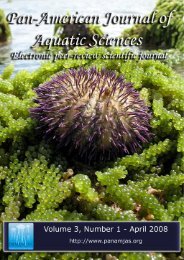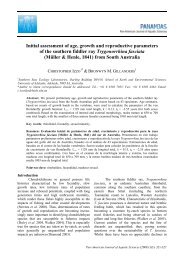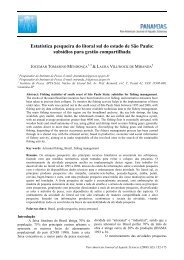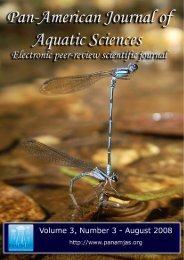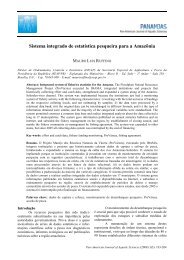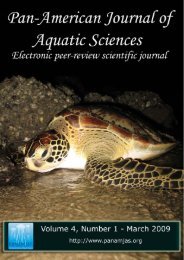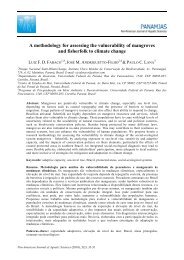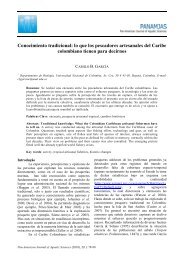Download full issue - PanamJAS
Download full issue - PanamJAS
Download full issue - PanamJAS
- No tags were found...
Create successful ePaper yourself
Turn your PDF publications into a flip-book with our unique Google optimized e-Paper software.
XIIIon the current state of knowledge and the discussions held during the workshop, the participants believethat it is still possible to save the coastal ecosystem and its environmental assets (ecological, social andeconomic) against scenarios of climate change, although urgency and determination are required toachieve this task.In order to adequately assess and monitor the effects of climate change on coastal ecosystems inBrazil, in an objective and regional manner, the following scientific goals have to be achieved urgently:1) Validation of regional climate models based on local observational data;2) Geodetically controlled measurements of sea level accompanied by altimetric surveys,integrating terrestrial and nautical cartography of important coastal regions of Brazil with scenarios for thetwenty-first century;3) Acquisition of long and sustainable time series of physical, chemical and biological processesin coastal waters;4) Greater understanding of factors controlling the processes of erosion and coastal progradation;5) Evaluation of the potential consequences of climate changes on aquatic biogeochemical cycles;6) Analysis of the responses of physiological and ecological populations, marine, estuarine andfreshwater communities and ecosystems on climate change;7) Assessment of variability in fish stocks and other natural resources of economic importance;8) Evaluation of social and economic vulnerability of coastal populations, particularly those thatdirectly depend on coastal resources and traditional activities.The advances in scientific knowledge on coastal ecosystems, with emphasis on the topics outlinedabove, will lead to better insights of the effects of climate change on coastal regions. Investments inenvironmental sciences in coastal areas, with emphasis on climate change are essential, therefore, forgreater understanding of these important ecosystems and their vulnerabilities.In this context, we recommend to the government and organized society that actions be created orstrengthened to promote:• The immediate reduction of emissions of greenhouse gases (GHGs) in order to contribute toslowing down global warming;• The immediate deterrence of deforestation in different regions of the country;• Advances in scientific knowledge on coastal ecosystems, with particular emphasis on topicsalready presented above, through the induction and effective support for research in these subject areas;• The strengthening of the monitoring system of the Brazilian Coastal Zone;• The development and implementation of management plans that promote the use, conservationand restoration of coastal ecosystems, considering climate change scenarios, thus strengthening existingand incidental public policies on this zone (National Coastal Management Program, “Orla” Project, SectorPlan for Sea Resources, National Plan for Water Resources, The Conservation National System, LocalAgenda 21);• The promotion and encouragement innovative solutions and actions that encourage adaptationmeasures in coastal cities and towns facing the new climate scenario;• The expansion of the critical insight and awareness of society regarding the Climate Change,through formal education (via educational institutions) and non-formal (via the media, nongovernmentalorganizations, civil organizations etc.), with dissemination of clear and contextualized information aboutscientific aspects of the topic in the appropriate language.For the implementation of these recommendations to be successful, depend on decision fromlocal, State and Federal public policies engaged to Climate Change. Agility and long-term commitmentare essential requirements to support and encourage the efforts of science and technology to confront andadapt to the challenges posed by climate change.Rio Grande, October 20 th 2009.Declaration approved by 124 scientists linked to 20 federal and state institutions (distributed in eightstates of the Brazilian coast) and three foreign institutions, belonging to leading groups in research on<strong>issue</strong>s related to the sciences of the sea.Pan-American Journal of Aquatic Sciences (2010), 5(2): XII-XV



